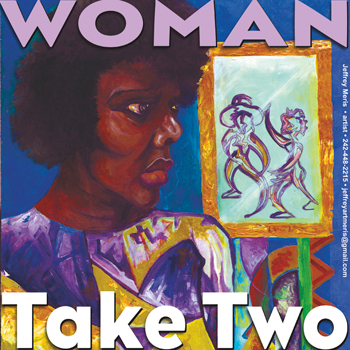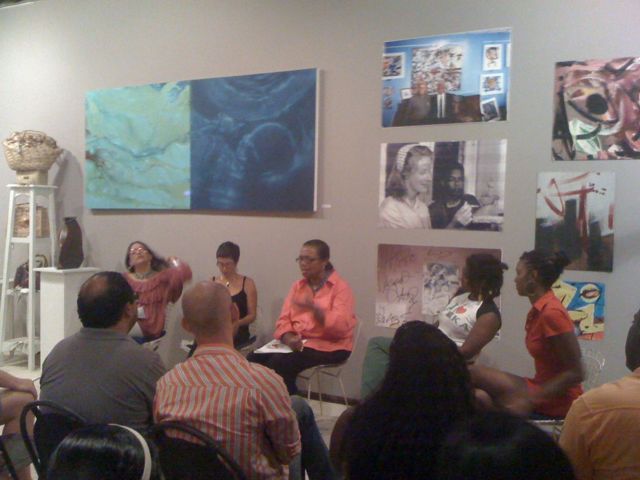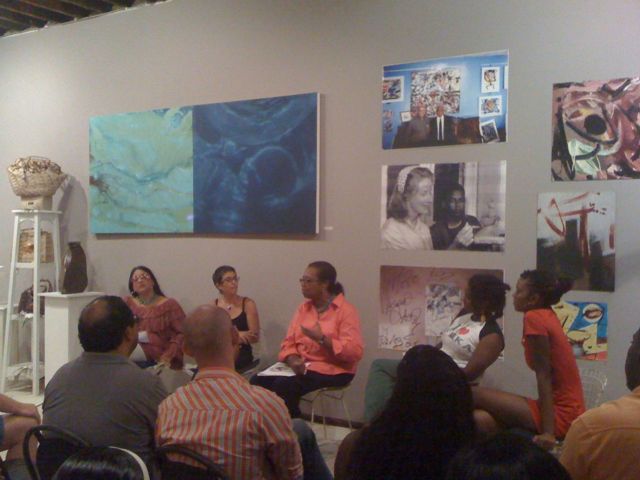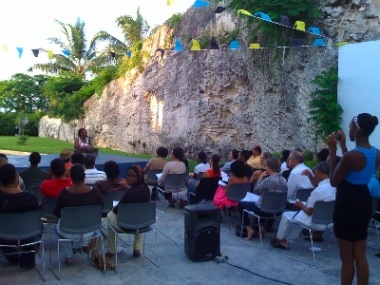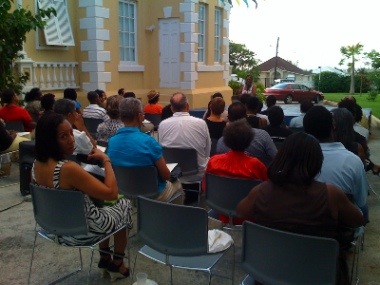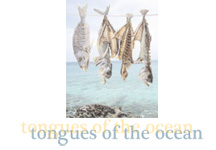Creating theatre in Nassau, Bahamas
For those of you who may not know, I do theatre in my spare time.
“Spare” may be a misnomer. “Unassigned” may be a better way of putting it. See, I work for a living because I have to; I need that regular income, and most of all I need that health insurance. I’m a college professor. I’m not dissing that. In fact, I happen to think it’s one of the best jobs in the world. It’s the only job in this country that will pay me to do half of what I love to do, which is write and talk, and that will even include that writing and talking when it comes time for promotion, and at the same time also allow me the flexibility and space to do the other half of what I love to do. I bless the people who dreamed up the College of The Bahamas and I bless those people who made it do all these things.
But if I had my druthers, I’d be working in theatre too.
OK, for those of you who do know me, you’re probably saying to yourself: “But she does work in theatre.”
And you’d be right, after a fashion. After all, I am one of the founders of Ringplay Productions, a theatre company that’s been around for the past 13 years, and I’m the founding director of the Shakespeare in Paradise theatre festival.
But nobody pays me to do either. And so I have to do it in spare, or unassigned, or off, time.
Before you ask me, the answer is, yes, I do have a problem with this. I didn’t twenty-five years ago when I started working in Bahamian theatre. In the 1980s, the Bahamas was in its second decade of independence, and had much bigger things to worry about than about providing careers for young artists. I wasn’t raised to pursue such a career, anyway. Even though my father had studied what might well have been the most esoteric thing for a young Bahamian to study at the end of the 1950s—classical piano performance at the Royal Academy of Music, London—my parents brought me up to be employable (my father wasn’t, not in the Bahamas, so a teacher he became). So I did not go to school to study theatre, even though I liked being on stage. I grew up “knowing” that the theatre was something one did for the love of it, despite all odds, and not something one did to make money from. Even though I wanted to write plays I never thought of doing it for a living.
But times change, and people change, and the world changes. In the 1980s we weren’t welcoming five million tourists to the Bahamas and wondering what on earth there was for them to do onshore here. In the 1980s, there were still some things for them to do (although that was the decade when things started to change). There were still cabaret shows in casinos which provided regular jobs for dancers; there were still nightclubs here and there which provided regular jobs for musicians; and there were record stores that bought musicians’ music. Maybe I’m painting too rosy a picture here, but it seems to me that in the 1980s Bahamians liked Bahamian culture.
But we’re not in the 1980s anymore.
It’s the twenty-first century. And if there were every a century in which creativity could flourish, this is it. We live in a time of revolution; publishing and production and filmmaking and composing and making music are in the hands of the creative artists, rather than locked up in boardrooms thousands of miles away in somebody else’s country. And tourism is also changing to reflect this new century. Tourists are not travelling merely for sun, sand and casino winnings. They are looking for unforgettable, unique experiences, and they’re paying premium prices for them. It’s never been a better time to be a creative artist anywhere—except the Bahamas.
Those of you who know me well may remember that ten years ago this October I took on the position of Director of Cultural Affairs for the Bahamas government. Those of you who know me very well may remember what I was like when I took on that job. I am a happier person now, they tell me. I am not so angry all the time. Not so driven. (I would dispute the second, but WTH). I wasn’t always angry and driven. I took on the job believing, as one does, that I could make a difference. I took on the job to help bring back some focus to the Bahamas and to revive a sense of pride in Bahamian culture. It’s important, I believe, to for individuals to have some things done by the collective around them that they can be proud of, but in 2003 too many Bahamians were behaving as though they were ashamed.
I had no idea I was embarking on a wild and crazy ride that would take me through wildernesses and woodlands, across oceans to different continents, to high heights and even lower depths and bring me back right to where I started.
When I worked out that I had gone full circle, or maybe had made a spiral which brought me back to the same point as I’d started from, only maybe further away from where we wanted to be, I left. And started the theatre festival you see me working with today.
Shakespeare in Paradise is now five years old. We have survived by the grace of God and our own hard, hard work. We have grown and done some work that we’re proud of, and because it’s our fifth year and the fortieth anniversary of independence for this country, we’re taking a big, big risk.
And I have no idea where we’ll be by the end of October. In all honesty, it looks like we’ll be tens of thousands of dollars in debt.
The reason?
We dream too damn big.
We’re reviving Sammie Swain, the folk opera that should be my father’s legacy but is dying because it hasn’t been performed for too long.
Why it hasn’t been performed is a long story which I’m proposing to tell here on this blog. There are some villains in this story, and some heroes too, and the villains and the heroes might not be who you think they are. And it’s all part of a much bigger story, which is still being written, but which so far is shaping up to be a tragedy. I want to tell that story too.
So I called this “creating theatre in Nassau, Bahamas” because I had hoped to get to the theatre part of the story. What you have is just the setting and the backstory. Bad storytelling, but live with it.
We’ll get where we’re going if you stay with the ride.
 4. Easter Sunday: RemembranceThe congregation’s young and old; few in between.A young man shakes my hand. His palm is hard—a worker’s palm—and hopeful for a wife.We honour woman-courage on this day:an empty tomb before Black Mary’s gaze.The women who aren’t girls all let themselves wear fatthat cloaks hard muscle, big hearts, brass voices.Their eyes are soft. Their green-eyed childreninhabit skins the shades of sand, of soil,of treebark, eggshell, cedar, earth, red loam.The braveheart women weep, and laugh.The rain falls with the Gospel.Christ is gone, the angel sings,and the silver rain falls down.
4. Easter Sunday: RemembranceThe congregation’s young and old; few in between.A young man shakes my hand. His palm is hard—a worker’s palm—and hopeful for a wife.We honour woman-courage on this day:an empty tomb before Black Mary’s gaze.The women who aren’t girls all let themselves wear fatthat cloaks hard muscle, big hearts, brass voices.Their eyes are soft. Their green-eyed childreninhabit skins the shades of sand, of soil,of treebark, eggshell, cedar, earth, red loam.The braveheart women weep, and laugh.The rain falls with the Gospel.Christ is gone, the angel sings,and the silver rain falls down. 5. Easter Monday: The North SideThis Atlantic: bluer than sacrament, brighter than pain,supplier of buoy-pots, candlewax, quilt-scraps, wrecks,ballastbricks for chimneystoves, old tyres for shoes,string and winecasks and even, maybe, bones—the things ships cast off when passing byor sinking down.The resurrection side.A blue hole swallows the unwary, offers upits perfect mystery. A thousand feet from shorea shelf dives undersea a thousand fathoms deep.The North Side ridge looks down. The water’s stripesbleed turquoise, blue, and indigo.You stare into the risen sun until you know.
5. Easter Monday: The North SideThis Atlantic: bluer than sacrament, brighter than pain,supplier of buoy-pots, candlewax, quilt-scraps, wrecks,ballastbricks for chimneystoves, old tyres for shoes,string and winecasks and even, maybe, bones—the things ships cast off when passing byor sinking down.The resurrection side.A blue hole swallows the unwary, offers upits perfect mystery. A thousand feet from shorea shelf dives undersea a thousand fathoms deep.The North Side ridge looks down. The water’s stripesbleed turquoise, blue, and indigo.You stare into the risen sun until you know.

